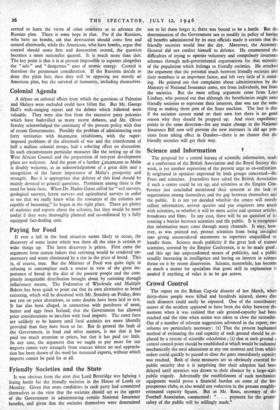Science and Information
The proposal for a central bureau of scientific information, made at a conference of the British Association and the Royal Society this week, is yet another expression of the present urge to co-ordination. It originated in opinions expressed by both groups concerned—the Press and scientists. Journalists have asked the British Association if such a centre could be set up, and scientists at the Empire Con- lerence just concluded mentioned their concern at the lack of organisation among themselves and the gap between themselves and the public. It is not yet decided whether the centre will merely collect information, answer queries and put enquirers into touch with scientists, or whether it will he more active and sponsor articles, broadcasts and films. In any case, there will be no question—of its creating a barrier between scientists and the public. It is recognised that information must come through many channels. It may, how- ever, as was pointed out, protect scientists from being inveigled into giving unconsidered statements to 'reporters unqualified to handle them. Science needs publicity if the great lack of trained scientists, stressed by the Empire Conference, is to be made good ; and this age has unprecedented means of publicity, and a public steadily increasing in intelligence and having an interest in science thrust on it by recent discoveries. Science, meanwhile, has become so much a matter for specialists that great skill in explanation is needed if anything of value is to be got across.






























 Previous page
Previous page